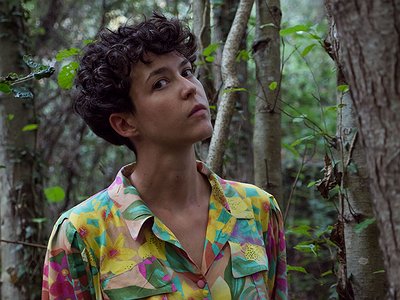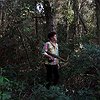Part 2
Could you describe your creative process on the basis of a piece or album that's particularly dear to you, please? Where did the ideas come from, how were they transformed in your mind, what did you start with and how do you refine these beginnings into the finished work of art?
Hard to chose one track to talk about. Maybe the easiest to explain is the title track of my album Laurisillva. It was composed 2 years ago, the oldest track of the release actuallly.
In summer 2017 Philip from The Tapeworm (my label) asked me for an unreleased track to be included on a cassette-compilation. Everything started from few sounds I had recorded with a modular synthesizer in one of the studios of my school. These sounds had a very “watery” quality, it's a kind of sound that I call a “sblob” or a “bubble”. I was back in Italy for vacations and suddenly there was a downpour, a quick summer one. So I went out with my Tascam to record the patterns of the rain dropping on different surfaces. In my head this image of a rainforest started to emerge, a humid habitat, something that was also connected to the kind of things that Jon Hassel's music evokes in my head.
So then I recorded some weird sounds with my sax, squeaky, noisy, wild timbres that in my mind were an imaginary fauna of this forest. That's why I then processed them with different reverbs and collocated each animal in a different position of the stereo image of the piece, to get this sensation of walking through the forest and earing those animals calling each other from different places. I added a midtempo bongo rhythm for amplifying the exotic vibes of it. I also captured the electromagnetic swish of my computer with a special device, that for me was the wind moving in between plants.
When that soundscape was composed I could make the main storyteller appear: my sax playing a melody, which I think sounds melancholic as these summer days certainly were. In the end I think I didn't use the field recording of the rain, or at least not in the album version of the piece, but it was very important to the whole process. My music is not always that clearly image-driven, but visualizing sounds as concrete objects (water, wind, animals etc) using them as metaphor of something else is something that I do very often in my compositional process.
There are many descriptions of the ideal state of mind for being creative. What is it like for you? What supports this ideal state of mind and what are distractions? Are there strategies to enter into this state more easily?
For me all you need is focus. To find focus is the hardest part, and my first strategy is to put my phone out of the room I am working in. Another condition is where you are, I think it helps a lot to have a place to work that is separated from where you sleep and eat. I like to “go to work”, and working at home is much more distracting.
In the past my musical activity was more emotion-driven and so I was getting creative when I was hit more intensely by a particular feeling (good or bad). It was more like an urge to transform emotions into something else. Now more often the starting point is an abstract idea or a specific sounds that attracts me and from there I start to imagine how this could be part of a more complex scenario.
I think the biggest enemy of the creative process is fear. When I enter a spiral of dense self-criticism and fear of failure I know I won't do anything. A good strategy is therefore to remind yourself that you are not the music you do and anything you will do will not defy you as human being. To me, it's much more important to be a good person than a good musician in the end.
How is playing live and writing music in the studio connected? What do you achieve and draw from each experience personally? How do you see the relationship between improvisation and composition in this regard?
From the studio experience I achieve more knowledge about how to structure a piece. You have time to try out solutions recombining all the parts in different orders for example. I also have the timeline of the software as a point of reference, which gave you a specific sense of time. Sometimes I start also to think graphically about how to collocate sounds.
When you play live it's less mental. What I am looking for is to feel what I am doing, to find that connection with your music that makes the difference between playing “doing your homework” and really delivering a special performance. Also, after a concert you have feedback from people and you immediately can share what someone else projects on your music, that's nice.
The studio dimension is more autistic. For me improvisation is also embedded in my studio practice because usually I compose my sax part recording improvisations and then selecting phrases I like the most from different takes.
How do you see the relationship between the 'sound' aspects of music and the 'composition' aspects? How do you work with sound and timbre to meet certain production ideas and in which way can certain sounds already take on compositional qualities?
I am very focused on the timbral quality of sounds I am working with, and that's what brought me to electronic music: the possibility to work with a broader timbral palette than just one instrument. I could call my approach timbral composition, but this doesn't mean that other components like melody are not part of it.
So yes timbre is actually always my starting point and everything else (structure, melody, meanings) seems somehow result from the timbral aspects of the sounds I start to compose with. It is a very complex discourse because first we should agree on the term “timbre”, which is a very slippery one, that's why it is more often explained with a non-definition like “it's everything else but pitch and loudness”. Timbre is always the result of an interaction of more parameters within a single sound. In that sense, a single sound can be a composition in itself with is inner logic. I see my music making as always swinging from composing sounds and composing with sounds (which means combining the microstructure of the single sound with the macrostructure of all piece).
Our sense of hearing shares intriguing connections to other senses. From your experience, what are some of the most inspiring overlaps between different senses - and what do they tell us about the way our senses work? What happens to sound at its outermost borders?
As I explained in the genesis of my piece “Laurisilva” I often visualize sounds in my mind, giving them roles, purposes, in the context of a piece. I can't explain more about this, but it surely is inspiring.
Art can be a purpose in its own right, but it can also directly feed back into everyday life, take on a social and political role and lead to more engagement. Can you describe your approach to art and being an artist?
This is something I am thinking about a lot recently. On the one hand I want to find more engagement in my artistic practice, but on the other hand I think more and more that it just comes naturally when you are an activist besides your music-making. So actually if you want to be more political, sometimes it is more effective to do politics instead of trying to push explicit political content in your music to prove you care about something.
I always tried to support my community i.e. my colleagues, that's why I was curating gigs and I always exchange contacts and tips, but that's not enough. This reaches just a small portion of people that are already privileged enough to try to live as musicians. I really admire projects like Oramics “Sounds Queer” space in Vienna. They are trying to make gear and knowledge accessible to everyone, especially marginalized groups. That's a much more effective way of using your skills to change something I think.
Recently I am often asking myself: For who I am performing? And who is gaining something from my music? Just me? I didn't find yet a really satisfying way to answer this. I hope in the future to use my skills to do something from which more people can benefit.
It is remarkable, in a way, that we have arrived in the 21st century with the basic concept of music still intact. Do you have a vision of music, an idea of what music could be beyond its current form?
Music in the past century was already exposed to a complete redefinition of its boundaries. What you can listen to at an experimental music gig nowadays is already the product of a big transformation. So I don't think the basic concept of music as It was even just 100 years ago is still intact, we just adapted to a new one, that seems natural to us now but it wasn't. “Music” is just a word. We still use it, but that doesn't mean that it signifies the same thing.






